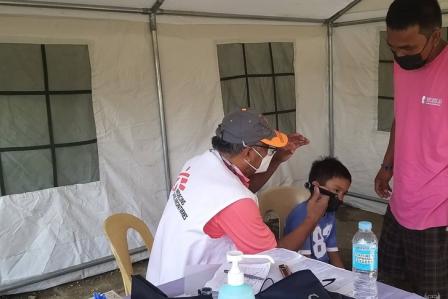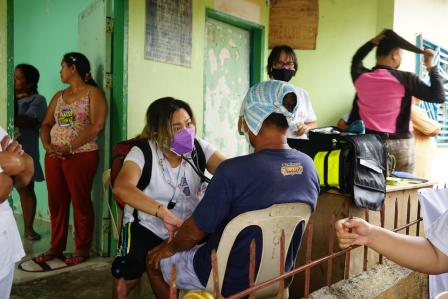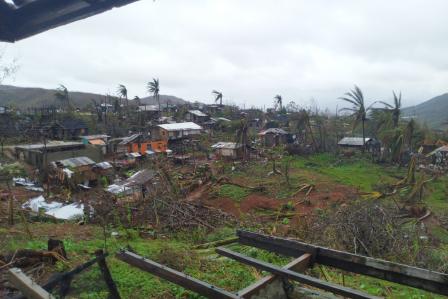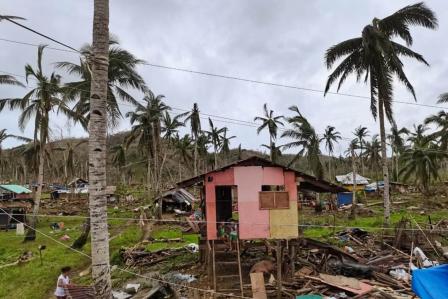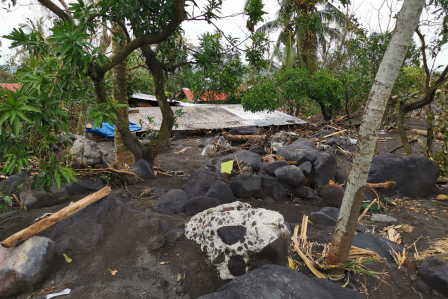Supertyphoon Man-yi hits the Philippines: “It’s like the storm took an axe to the trees”
Some residents evacuated to Dinadiawan Elementary School during the storm, where later rooftops were torn off the buildings, and trees broke down cement walls. Philippines, November 2024. © Regina Layug Rosero/MSF
Rooftops have been ripped from houses and community centers. Segments of metal sheeting are wrapped around trees that are now empty of leaves and branches. Mountain roads are covered in mud, rocks and tree branches from landslides. “It’s like the storm took an axe to the trees, and destroyed much of Aurora,” said one local.
This is the devastation left behind by Supertyphoon Man-yi (local name Pepito), the sixth storm to hit the Philippines in a single month. Man-yi made two landfalls: first in Panganiban, Catanduanes, on 16 November, and in Dipaculao, Aurora Province, the day after.
On 25 November, Doctors Without Borders / Médecins Sans Frontières (MSF) launched a mobile clinic in the seaside community of Dinadiawan, in Dipaculao, Aurora. For one week, Doctors Without Borders was joined by the Department of Health and provincial and municipal healthcare workers to provide comprehensive healthcare services to the community. These services include medical consultations, mental health and psychosocial support, wound care, routine vaccinations, dispensing of medications and screening children for malnutrition.
Nurse Briccio Echo Jr. works with a local nurse to triage patients at the mobile clinic. Philippines, November 2024. © Regina Layug Rosero/MSF
“The winds were so strong.”
Dinadiawan, Dipaculao, is a seaside community of approximately 5,000 individuals, and one of the most severely affected areas in the entire Aurora Province. Landslides followed the heavy rains, hampering access on mountain roads, while storm surges devastated structures closer to shore.
When warnings were announced for Man-Yi, many took refuge in Dinadiawan Elementary School. Delia Macalipay, aged 63, evacuated there with her family.
“The winds were so strong. We hid behind a mattress, to protect ourselves. All the children were there, and I was holding the mattress. I didn’t realise my foot was exposed, so when the wind broke the glass in the window, my foot was injured,” she said. She came to the Doctors Without Borders mobile clinic to have her foot examined. “It’s lucky the glass didn’t get stuck in my flesh.”
Though her injury had healed, her foot was swollen from being submerged in rainwater.
Dr. Marve Duka-Fernandez was the Medical Team Leader for this intervention. “Over five days, we saw a total of 549 patients. Many of them were suffering from upper respiratory tract infections. We also saw many patients who were above 60 years old and suffering from poorly controlled hypertension.”
There were patients with lacerations, punctures, head wounds, from different accidents that occurred either during the storm, or while they were cleaning up and rebuilding afterwards. We saw dog bites as well. While these injuries are typical after such a disaster, the anger is that these wounds can be left unattended for too long, or become infected. This is because people are too busy with repairs and cleanup to seek medical attention, or are too focused on the needs of other family members to attend to their own injuries.Dr. Marve Duka-Fernandez
“A landslide swept our home away.”
Rosalinda Tabil, aged 41, came to the mobile clinic with a wound on her arm. “I was trying to open a can of sardines to feed my family. I didn’t have a can opener, only a knife. The knife slipped and went into my arm.”
Tabil and her family had taken refuge with relatives. In their haste to flee to safety, they were forced to leave everything behind. With her children and other family members, there were eight of them crammed into a small space, where they could only pray that the roof above their heads would not be torn away by the wind. They had evacuated to the low-lying areas closer to the waterfront, because their own home was in the mountains.
“We had to cross three bridges to get here,” she said. “When we went back to check on our house, it was gone. A landslide swept our home away.” Along with their home, all of their possessions were also swept away.
Nurse Daryll Von Abellon cleans a leg wound on a teenaged boy. Philippines, November 2024. © Regina Layug Rosero/MSF
Mental health struggles: “What will happen to my family if I die?”
Alongside the mobile clinic, Mental Health Lead Sarah Jane Deocampo spoke to patients about their experiences and trauma. In total, Doctors Without Borders conducted psychoeducation sessions for 55 individuals, providing essential knowledge on mental health and coping strategies. The Doctors Without Borders team also provided Psychological First Aid (PFA) individual counseling to 35 individuals, and facilitated a group processing session for 11 community frontliners and leaders.
Deocampo observed, “Many of those who sought counseling are elderly patients. Many of them
were also female. But we also had men who wanted to talk about their experiences and trauma from the disaster.”
They are so focused on taking care of their families, on trying to rebuild their homes and their lives, on figuring out how to move forward from this disaster, that they ignore their own feelings along with their own injuries and health issues. When they finally come to us for counseling, they allow themselves to cry and to release their fears and frustrations. Only then do they allow themselves to feel something other than despair, and only then can they think of their future.Sarah Jane Deocampo, Mental Health Lead
Evangelina Ramiro made sure her family members had medical consultations before she agreed to have an individual counseling session. Deocampo shared, “She has two children and two grandchildren who are mute. At 73 years old, she is still the one taking care of her whole family. Her husband died years ago, and her other children have left Aurora province. She told me, ‘My mind is still capable, but my body not as much. What will happen to my family if I die? They cannot even cook their own meals.'”
“Still, after our counseling session, she said, ‘Salamat, anak. (Thank you, my child). For a little while, I felt like I was not drowning in my troubles.'”
Challenges in access and assessment
Man-yi affected many areas that were still recovering from the previous cyclones. Doctors Without Borders visited the provinces of Catanduanes in the Bicol Region, and Cagayan, Isabela, Nueva Vizcaya, and Aurora in Northern and Central Luzon, to assess the needs of affected communities.
Logistician Daryll Von Abellon shares, “To assess Cagayan, Isabela, Nueva Vizcaya, and Aurora, we would spend four to five hours driving one way to reach a community, then we would spend another four hours to head back to Tuguegarao City, Cagayan, before dark."
"We could only reach one municipality per day, two if we were lucky. There was one day where we were on the road for over 14 hours. Once we had to double back, because though we had almost reached Aurora province, severe landslides had blocked the way, and local authorities deemed it too dangerous for anyone to pass," he continued.

To reach Dinadiawan, Dipaculao, from Baler, the capital of Aurora Province, the team would drive nearly two hours on zigzag roads between mountains and ocean. For several days after Supertyphoon Man-yi, many of the roads had been blocked due to landslides. Philippines, November 2024. © Regina Layug Rosero/MSF
“Another challenge was the fact that six storms had devastated the country in a single month. We had to determine which among the affected areas was most affected by the most recent storm, which one had the greatest needs, which ones we could access. Local disaster response teams and health offices told us, ‘We were ready for one or two storms this month, but there were six, and that was just too much.’”
To reach Dinadiawan, Dipaculao, from Baler, the capital of Aurora Province, the team would drive nearly two hours on zigzag roads between mountains and ocean. In Dipaculao, the mobile clinic was set up on roads less than a kilometer from the shore, where wood and other debris were still scattered all over the beach.
After a week of mobile clinics in Dinadiawan, Doctors Without Borders conducted psychological first aid training for 30 healthcare workers from the Aurora Provincial Health Office. Doctors Without Borders concluded the emergency response on December 2, 2024.

